Rocky obstacle
Updated: 2013-07-12 10:53
(www.asianewsnet.net/The Korea Herald)
|
||||||||
Tokyo has prompted a strong protest from Seoul by reiterating its claim to South Korea's easternmost islets of Dokdo in its annual defence paper released Tuesday.
A Foreign Ministry spokesman said Seoul would never tolerate Tokyo's claim to Dokdo, which "is clearly indigenous territory of Korea in terms of history, geography and international law".
The annual report, the first issued under hawkish Prime Minister Shinzo Abe who took office in December, also criticised China for having taken coercive action in a dispute with Japan over a group of islands claimed by both countries.
Japan's repeated claim to Dokdo amounts to abandoning normal relations with South Korea, which regained its independence from Tokyo's colonial rule and reclaimed sovereignty over its territories, including the rocky islets in the waters between the Korean Peninsula and Japan.
It comes in the context of Japan's distorted perception of its pre-1945 wartime history, which has hampered tripartite cooperation with South Korea and China to achieve peace, stability and prosperity in Northeast Asia.
The prospect of such collaboration will be further darkened if Abe attempts to use his expected win in a key election set for July 21 to advance his nationalist agenda such as revising the pacifist constitution, boosting the military and reassessing Japan's wartime history. His conservative ruling bloc is forecast to secure a majority in the upper house, giving him control over both chambers of the legislature.
Abe's anachronistic course would further alienate his nation from its two neighbouring countries, which have recently accelerated efforts to strengthen their partnership, forming a concerted stance against Japan over historical and territorial issues.
In a joint statement issued after their summit in Beijing last month, South Korean President Park Geun-hye and her Chinese counterpart Xi Jinping expressed concern over the unstable regional situation, in which they noted confrontation and distrust had deepened over historical matters.
Despite its recent moves to increase pressure on North Korea to give up its nuclear weapons programme, China has still put priority on convening multilateral talks to discuss the matter, while South Korea has stood with the US and Japan in demanding Pyongyang take sincere steps toward denuclearization before coming to the negotiating table.
At this junction, Seoul seems to face a delicate strategic choice on how to build a network of effective coordination for resolving the North Korean nuclear problem. Pyongyang has recently tried to disrupt the international sanctions regime by showing enthusiasm for returning to the six-party talks, which also involves Russia, and resuming dialogue with Seoul.
In this regard, Seoul officials may need to be cautioned against shifting too hastily the weight of security cooperation to China from Japan, which would also put the US in an awkward position. Cooperation with Tokyo would also be essential to consolidating the framework for regional peace and stability.
But Japan's repeated moves deviating from correct historical perceptions, including its latest territorial claim to Dokdo, leave South Korea with little room for striking a strategic balance between its two neighboring powers.

 BASE jumpers celebrate their annual event
BASE jumpers celebrate their annual event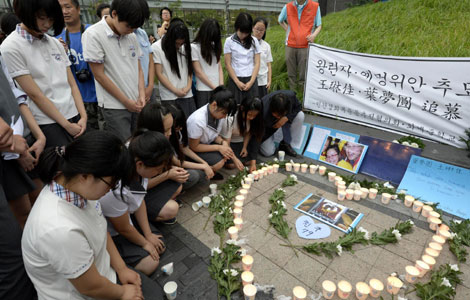
 S Korean students mourn Chinese victims of air crash
S Korean students mourn Chinese victims of air crash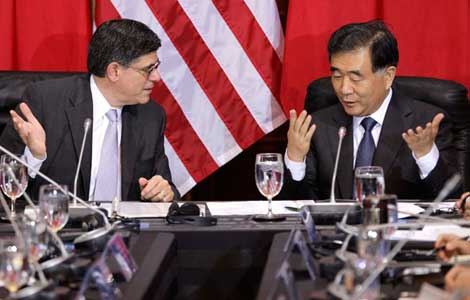
 Constructive mood at talks
Constructive mood at talks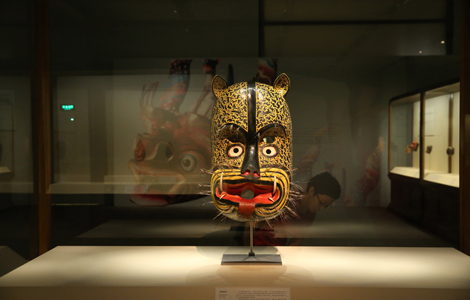
 Masks reveal unknown worlds
Masks reveal unknown worlds
 Pathfinder pianist
Pathfinder pianist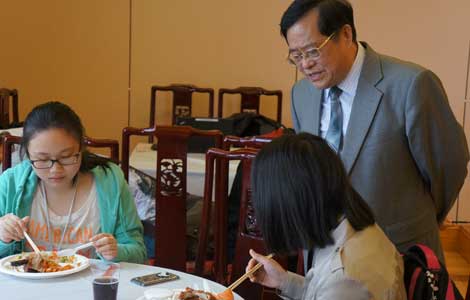
 Surviving students hosted by consulate
Surviving students hosted by consulate
 China investigates GSK executives for bribery
China investigates GSK executives for bribery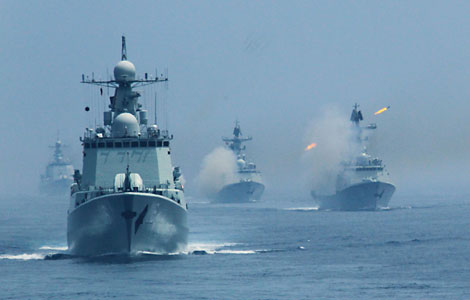
 China, Russia complete 3-day joint naval drill
China, Russia complete 3-day joint naval drill
Most Viewed
Editor's Picks

|

|

|

|

|

|
Today's Top News
Asia spending too little on poor: report
More Americans favor immigration: Gallup
Constructive mood at Sino-US talks
China, Russia consider increasing naval drills
2 pilots called for Asiana to abort landing
Increased cooperation brings benefits
Japanese defense report lashed out
Lifesaving top priority, premier says
US Weekly

|

|






